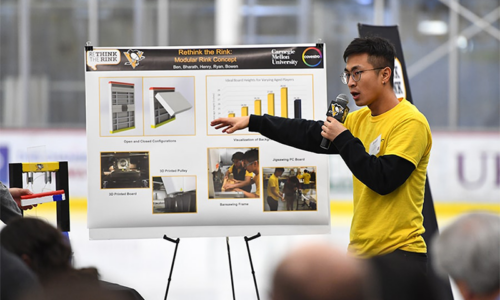Learning Objectives:
Harnessing data can help scientists and engineers achieve astonishing breakthroughs from building autonomous cars to developing personalized healthcare. However, capturing and collating data by itself cannot be useful unless we learn how to understand them, interpret them and how to extract patterns, often implicit, from them. In this course we talk about
- how to tweak data to be amenable to various techniques and sciences such as Artificial Intelligence, Machine Learning, etc.
- We will try to learn basic ideas behind data science, machine learning, statistics and AI.
- We will work on few methods and techniques that are essential in most data driven projects.
- get the required skills to apply these algorithm using some basic programming language (e.g., Python, Java or C++)
- perform an individual or group project guided by the instructor including a presentation and report
Instructor Introduction:
Course Output:
- Instructor will write individual recommendation letter for each student
- Certificate signed by instructor if student attends all lectures and conducts final project successfully
Target Group:
- Students with technical/Math background and programming skills who want to learn about AI and Machine Learning
Requirements for Students:
- attend sessions and participate in discussions
- conduct a small-project including the writing of a research report • give a short (approx. 10 min) presentation in the final session
Phase 1: Preparation
- become familiar with the basics of Python – Python short course/notes will be giving to students before the start of the course
- students will be asked to solve few python programming challenges beforehand. The solutions will be given to students as well
Phase 2: Lectures
Lecture 1:
- Introduction to Artificial Intelligence and Machine Learning
- Reasoning Techniques, Deductive, Inductive, Abductive, etc
Lecture 2:
- Search in Problem Solving
- Informed and Uninformed Search
- Heuristic functions and Optimality
Lecture 3,4:
Machine Learning Overview
- Find-S method, Decision Trees and Artificial Neural Networks, Entropy, Information Gain and Statistical Metrics
- Backpropagation, Gradient Descent and ANN Threshold Functions
- Evaluating ML Models
Phase 3: Discussion and Project Preparation
Session 5&6: Discussion, Finding Topic
- Instructor will briefly sketch some other important Machine Learning algorithms
- Instructor will briefly discuss some real work applications on AI particularly related to Health Care domain
- Instructor and students discuss potential topics for projects
- Students pick topics and form groups
- Q&A
Session 7&8: Project Planning: Evaluation and Implementation
- Students present project proposal (topic, algorithms, programming language and data sets)
- Instructor gives feedback, provides literature pointers, and addresses other issues
- Instructor gives a brief presentation on some challenges that arise when implementing and evaluating Machine Learning Algorithms: Training vs. Test Error, Learning Rate, Underfitting and Overfitting, Feature Selection, Occam’s Razor
- Q&A
Session TA: Project Preparation, General Advice for Career in Research/Academia
- Students discuss implementation and evaluation with instructor
- Instructor will explain how to create a scientific presentation and report
- Instructor will give general advise on how one can be successful in research and how to write successful applications (e.g., creating a CV, finding a suitable research topic/supervisor/university, writing research statement etc.)
Session TA: Student Presentations
- Students present their project in a short presentation (approx. 10-15 mins) • Instructor and students engage in a brief Q&A after each presentation
- Students will receive detailed feedback and advise how to improve on presentation skills, simplifying and summarizing a scientific work for audience
Phase 4: Report
- Students finalize their report and submit
- Students will receive detailed feedback within one week including ways to improve their work, how to carry on literature review and better implement a scientific approach
Course Features
- Lectures 1
- Quizzes 1
- Duration 10 weeks
- Skill level All levels
- Language English
- Students 5
- Assessments Yes






